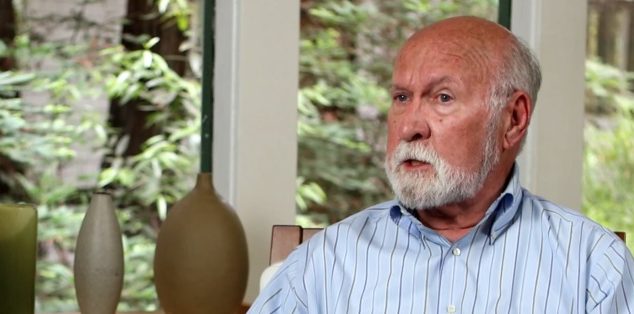News
Rodeos: Activist saddles up against ‘macho crap’
 Animal rights activist Eric Mills of Oakland. (Photo: Screen capture, actionforanimals-oakland.com)
Animal rights activist Eric Mills of Oakland. (Photo: Screen capture, actionforanimals-oakland.com)California has seen ideological clashes throughout its 170-year history as a state, and they are not all confined to Democrats vs. Republicans, north vs. south, coast vs. inland, or rural vs. urban.
One of today’s sharpest — but little known — battles is between rodeo boosters and those who find rodeos cruel and silly. Foremost among the latter is Eric Mills of Oakland, who calls rodeos “just a bunch of macho crap.”
Mills, who is in his 80s, grew up in the rural South and became a member of the Audubon Society at age 10. He is not opposed to all rodeo events – just those he believes terrify animals and result in death or injury.
Rodeo backers maintain they preserve western traditions and contribute to scholarships and charities.
That list includes steer wrestling, where a contestant wraps his arms around the animal’s neck and attempts to wrestle it to the ground, and bull riding, where, according to animal rights organizations, bulls buck for two reasons: They’re shocked out of the chute with help from an electric cattle prod, or they’re bucking madly because of a rope tied around the testicles.
The two sides sometimes appear to live on different planets.
According to Russell Fields, the longtime manager of the Rowell Ranch Pro Rodeo in Eastern Alameda County’s Castro Valley, animals don’t feel fear during rodeo events.
Television reporter Dan Noyes once asked Fields: “Do you deny that the animals feel fear?”
Fields: “Nah, I don’t think they feel fear. They’re an animal … no.”
“That’s the dumbest thing I’ve ever heard. Jesus Christ! It makes me want to hyperventilate,” Mills said after hearing the exchange.
Mills argues against rodeo cruelty before public bodies and has marched in San Francisco’s Gay Pride parade holding the sign “Queers for Steers.”
Rodeo backers maintain they preserve western traditions and contribute to scholarships and charities, and are careful of animals’ welfare. Rowell Ranch Rodeo supporters range from the Castro Valley Sanitary District to Coors beer.
The Rowell Ranch Pro Rodeo website declares:
“There are more than 70 rules governing all aspects of livestock care and handling at PRCA (Professional Rodeo Cowboys Association) rodeos including the equipment used, the time allowed for competition and the condition of the facilities.”
The PRCA says that at least 5,000 rodeos are held annually across the country. The association estimates that 30 million people attend rodeos that it sponsors each year, and the audience is growing.
Rodeo interests are frequently in Sacramento and some observers say their lobbyists can be easily identified in Capitol hallways by their cowboy hats and waxed handlebar mustaches.
Mills keeps up a near-constant stream of letters to politicians and newspaper editors, argues against rodeo cruelty before public bodies and has marched in San Francisco’s Gay Pride parade holding the sign “Queers for Steers.”
Some involved in the anti-animal-cruelty movement feel that the abuse of animals is part of the mindset that has subjugated women, ethnic minorities and gay people throughout history. Rodeo backers say it’s part of a Western and patriotic heritage.
Mills strongly backs SB 376, introduced by Sen. Henry Stern (D-Calabasas), which would impose further restrictions on the importation and sale of wild animals for food.
Mills has not confined himself to rodeos.
He has taken on live food markets, popular with California’s Asian population. Market keepers have been importing live frogs and turtles for sale to their customers. Mills argues against the practice, citing inhumane killing of the animals; the importation, sale and deaths of protected turtle species; and the import of diseased bullfrogs. Mills says the bullfrogs often escape or are released, and pose problems for native frogs due to the disease and competition for resources.
Mills strongly backs SB 376, introduced by Sen. Henry Stern (D-Calabasas), which would impose further restrictions on the importation and sale of wild animals for food.
Mills treasures a letter he received from the late farm labor leader Cesar Chavez, a vegetarian, which reads in part:
“Kindness and compassion toward all living things is a mark of a civilized society. Conversely, cruelty, whether it is directed against human beings or against animals, is not the exclusive province of any one culture or community of people.
“Racism, economic deprival, dog fighting and cock fighting, bullfighting and rodeos are cut from the same fabric: violence.
“Only when we have become nonviolent towards all life will we have learned to live well ourselves.”
The argument is vigorous, with both sides dedicated. It’s unlikely to end soon.
—
Ed’s Note: Corrects spelling to Rowell, sted Powell, 6th-11th grafs.
Want to see more stories like this? Sign up for The Roundup, the free daily newsletter about California politics from the editors of Capitol Weekly. Stay up to date on the news you need to know.
Sign up below, then look for a confirmation email in your inbox.

Leave a Reply